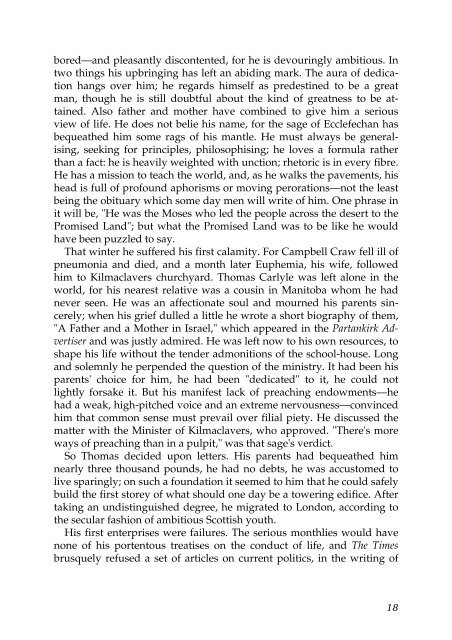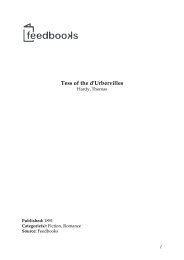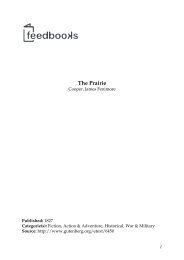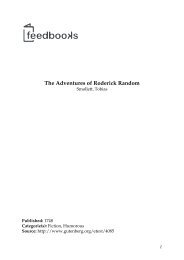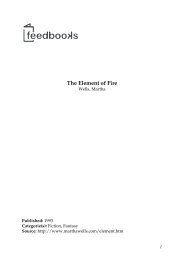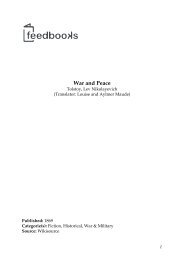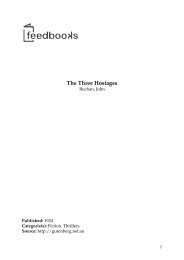You also want an ePaper? Increase the reach of your titles
YUMPU automatically turns print PDFs into web optimized ePapers that Google loves.
ored—and pleasantly discontented, for he is devouringly ambitious. In<br />
two things his upbringing has left an abiding mark. The aura of dedication<br />
hangs over him; he regards himself as predestined to be a great<br />
man, though he is still doubtful about the kind of greatness to be attained.<br />
Also father and mother have combined to give him a serious<br />
view of life. He does not belie his name, for the sage of Ecclefechan has<br />
bequeathed him some rags of his mantle. He must always be generalising,<br />
seeking for principles, philosophising; he loves a formula rather<br />
than a fact: he is heavily weighted with unction; rhetoric is in every fibre.<br />
He has a mission to teach the world, and, as he walks the pavements, his<br />
head is full of profound aphorisms or moving perorations—not the least<br />
being the obituary which some day men will write of him. One phrase in<br />
it will be, "He was the Moses who led the people across the desert to the<br />
Promised Land"; but what the Promised Land was to be like he would<br />
have been puzzled to say.<br />
That winter he suffered his first calamity. For Campbell Craw fell ill of<br />
pneumonia and died, and a month later Euphemia, his wife, followed<br />
him to Kilmaclavers churchyard. Thomas Carlyle was left alone in the<br />
world, for his nearest relative was a cousin in Manitoba whom he had<br />
never seen. He was an affectionate soul and mourned his parents sincerely;<br />
when his grief dulled a little he wrote a short biography of them,<br />
"A Father and a Mother in Israel," which appeared in the Partankirk Advertiser<br />
and was justly admired. He was left now to his own resources, to<br />
shape his life without the tender admonitions of the school-house. Long<br />
and solemnly he perpended the question of the ministry. It had been his<br />
parents' choice for him, he had been "dedicated" to it, he could not<br />
lightly forsake it. But his manifest lack of preaching endowments—he<br />
had a weak, high-pitched voice and an extreme nervousness—convinced<br />
him that common sense must prevail over filial piety. He discussed the<br />
matter with the Minister of Kilmaclavers, who approved. "There's more<br />
ways of preaching than in a pulpit," was that sage's verdict.<br />
So Thomas decided upon letters. His parents had bequeathed him<br />
nearly three thousand pounds, he had no debts, he was accustomed to<br />
live sparingly; on such a foundation it seemed to him that he could safely<br />
build the first storey of what should one day be a towering edifice. After<br />
taking an undistinguished degree, he migrated to London, according to<br />
the secular fashion of ambitious Scottish youth.<br />
His first enterprises were failures. The serious monthlies would have<br />
none of his portentous treatises on the conduct of life, and The Times<br />
brusquely refused a set of articles on current politics, in the writing of<br />
18


